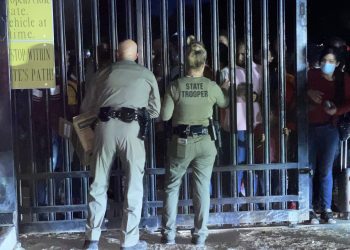DES MOINES, Iowa – Gov. Kim Reynolds gave her fifth Condition of the State address in the Iowa House chambers Tuesday evening. She highlighted tax reform, education reform, and workforce development in her speech that lasted just under 50 minutes.
Regarding tax reform, Reynolds said, “Last year, the state ended with a $1.2 billion surplus, on top of nearly $1 billion cash reserves. That’s good. We kept spending down. But it also means that, despite the historic 2018 tax cuts, we’re still taking too much from Iowans’ paychecks. That needs to stop. Now.”
She made several proposals, including cutting Iowa’s tax brackets from nine to one – four percent over four years. The Governor’s office says their plan is starting in 2023 to implement four tax brackets ranging from 4.4 percent to six percent. Then each year until 2026, the top rate would be eliminated annually until the state has a four percent flat tax.
“By 2026, when the bill is fully implemented, an average Iowa family will pay over $1,300 less in taxes, which is on top of their $1,000 tax cut from the 2018 bill,” Reynolds said. “That’s money that can be reinvested into our economy and used to promote the prosperity of every Iowan.”
The bill she plans to introduce would eliminate the income tax for retirement income, exempt net capital gains on the sale of employee-awarded capital stock.
Reynolds also wants to reform Iowa’s corporate income tax by buying down the top corporate income tax rate every year the receipts for that tax exceed $700 million until the tax is capped at 5.5 percent.
She proposed addressing growing Iowa’s workforce by improving access to childcare by expanding a grant program implemented last year to provide another 5,000-plus childcare openings across the state in addition to the 4,000 openings it has already created.
Reynolds pointed out that access to childcare is not the only challenge to growing the state’s workforce.
“There are many reasons for the worker shortage, but we need to recognize that, in some cases, it’s because the government has taken away the need or desire to work. The safety net has become a hammock,” she said. “Don’t mistake me; this isn’t the only cause. But it’s a growing problem, and it’s not just an economic one.
“There is dignity in work; it gives us meaning and purpose. So when it’s degraded, when idleness is rewarded with enhanced unemployment and stimulus checks, when work begins to seem optional rather than fundamental, then society begins to decay,” Reynolds added.
She plans to transition Iowa’s unemployment system to a “re-employment system” and announced the creation of a separate re-employment division within the state. She also plans to introduce legislation that reduces unemployment benefits from six months to 16 weeks.
Reynolds also said she wants to address licensing requirements that hinder workers from moving into the state. She also highlighted her desire that the state implements tort reform.
She also praised apprenticeship programs, particularly those in the healthcare field, and plans to launch a new healthcare registered apprenticeship program that will provide funding to at least five communities that would follow a model seen in Pella, Iowa.
Reynolds also wants to launch the first teacher registered apprenticeship program in the nation to let schools “grow their own workforce.”
“High school apprentices start classroom instruction in their junior year and, within a year of graduation, they can earn a paraeducator credential and associates degree. And for paraeducators, their day jobs will count toward student teaching requirements, greatly reducing the cost and time required to become a teacher,” she explained.
Reynolds also announced a plan to use federal funds to offer retention bonuses of $1000 for educators who remained on the job in the pandemic and who plan to stay on during the next school year.
Later in her remarks, she said she plans to also offer retention and recruitment bonuses for law enforcement officers worth $1,000, also using federal funds.
Pivoting to education, Reynolds addressed parental concerns about certain books found in several school districts in Iowa.
“Recently, several parents brought to light that schools are buying and teaching with books that contain vulgar and sexually explicit material involving minors. These books are so explicit they’d be X-rated if they were movies. The content is so bad that after a parent read them at a school board meeting, the district took the live stream down from its website because the passages were too inappropriate—and yet many of these books remain in school libraries today,” she said.
“We live in a free country with free expression. But there’s a difference between shouting vulgarities from a street corner and assigning them as required classroom reading. There’s a difference between late-night cable TV and the school library. If school boards and administrators refuse to understand that—if they believe the classroom is about pushing their worldview—then we’re on the wrong path,” Reynolds added.
She proposed legislation that would require public schools to publish course syllabuses, materials, and available library books online.
“All schools should be required to publish what they’re teaching. There’s no reason to hide it—at least no good reason. The same goes for the books in the library. Parents should know what their kids have access to, and they should have a timely process to address their concerns. Because when our parents are fully informed, they can make informed choices,” Reynolds said.
She also wants to reintroduce an education savings account plan, called Students First Scholarships, that would be first implemented during the 2022-2023 school year. Scholarships would be worth 70 percent of the state’s per-pupil spending, currently $5,359. To be eligible, a student must be enrolled in a public school for the 2021-22 school year and have a household income that does not exceed 400 percent of the federal poverty level or have an individualized educational plan (IEP).
Reynolds said the remaining 30 percent of the per-pupil funding would remain with the state for reallocation to smaller school districts.
“We want to ensure our small schools stay strong while, at the same time, empowering parents to choose what’s best for their child,” she explained.
Through this program, Reynolds said she wants every school to be the best it can be as she believes school choice programs can increase the quality of all schools.
“When our schools succeed, Iowa becomes a destination of choice for parents everywhere,” she explained.
Reynolds also addressed the biofuels industry in Iowa, announcing that she plans to introduce legislation to improve access to E15 and B20 and upgrade Iowa’s fuel infrastructure to offer higher blends.















